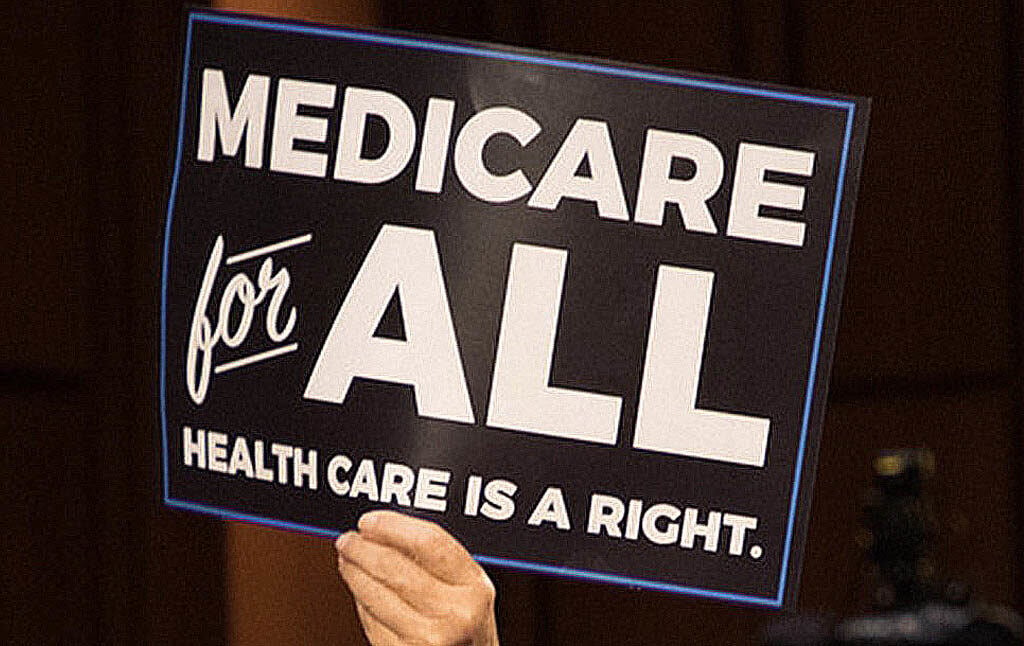As we gear up for the all-out brawl that will be the 2020 Democratic presidential primary, the policy battle lines are being etched. Healthcare was central in the 2018 midterms, and it will be a core issue in 2020. Over the last several years, the call for “Medicare-for-All” has reached a crescendo pitch. Polls show 50 to 70 percent popularity overall, with support among Democrats soaring above 80 percent.
That’s a long way from the obscurity in which single-payer healthcare had lingered for decades, long derided by rightward Democrats and Republicans alike as unworkable, overpriced, or even “not American” (in the words of billionaire Starbucks CEO Howard Schultz). Given its popularity, many Democrats have co-sponsored Medicare-for-All bills in the Senate and the House—a full 17 Senators and 124 Representatives. Many of the leading potential presidential contenders have co-sponsored the bill, such as Kamala Harris and Elizabeth Warren, and support for Medicare-for-All has become one of the most important political litmus tests of 2020.
But opponents to single-payer healthcare within the Democratic party haven’t gone away. They are lining up. Yet strangely, rather than lining up to oppose Medicare-for-All, they’re lining up to support it. Rather than take a loss for opposing a popular policy, they’ve identified a different strategy: rebrand it. Embrace the name, ditch the policy—redefine it until it means whatever you want it to mean.
Here’s an example. Former Governor Terry McAuliffe, in an interview teasing a run for President, recently announced his support for Medicare-for-All. Well, kind of.
“We all support Medicare for all.” And then he hedged: “But we have got to figure out how we pay for it. It’s unrealistic in terms of how we pay for it today. But do we want everybody covered under health care? Of course, we do…I’m saying I support that everybody in this country gets access to quality, affordable health care, whatever you may want to call it.” Later he added, “We can’t be making promises that are not realistic.”
This muddling of a simple concept is being echoed by pundits, too. “Democrats have embraced a politically powerful, but intentionally confusing, slogan to describe their health care goals,” argued one. Ezra Klein said it was a “confused and confusing” debate and that Medicare-for-All “doesn’t mean what it sounds like it means.”
Only the phrase “Medicare-for-All” is actually quite clear. For the past several decades “Medicare-for-All” has had a clear meaning, describing a specific set of bills in Congress—first introduced by Congressman John Conyers in 2003 as “Expanded and Improved Medicare for All Act.” Medicare-for-All bills have been introduced in every Congress since then, and a new version is slated to be released in the House this month. What’s changed is that opponents to single-payer healthcare are trying to confuse the meaning of Medicare-for-All.
So let’s be clear about what Medicare-for-All actually means. It means single-payer healthcare that would provide cradle-to-grave government-supported healthcare for all Americans. Under the current version, it would be free at the point-of-care so that it doesn’t discriminate against low-income Americans. And it does not rely on the private health insurance industry, though opinions differ about whether or not private plans would be fully eliminated or allowed as a surplus luxury (like the insurance you can buy for your new headphones from Best Buy to bolster their general returns policy). There are, no doubt, some really important policy discussions to have about the form and function of real Medicare-for-all, but they don’t include stripping out the engine.
Yet the name has been used to describe plans that do just that. One example is the Center for American Progress’s (CAP) plan called “Medicare Extra for All,” a name specifically designed to apply the Medicare-for-All brand to a plan that is definitely not single-payer healthcare. In fact, the plan is probably best described as “Medicare-for-more” combined with a public option. But to the average reader, it would seem like CAP’s plan does everything plain old Medicare-for-All does—with “extra”! Why wouldn’t you want that?
To be fair, it fixes some of the holes in Medicare—appending vision and dental, for example, and allowing the program to bargain down drug prices. It would also create a pathway to universal coverage. But it has serious shortcomings. Except for the poorest Americans, the CAP plan would require most Americans to pay significant deductibles, co-pays, and premiums that act as a barrier to care for too many. The CAP plan also leaves our system of private, job-based insurance largely in place. It’s difficult to predict how many employers and employees would end up on the public option, but under the CAP plan well over 100 million Americans might still be enrolled in a vast array of private plans. This saddles our healthcare system with hundreds of billions of dollars in excess overhead costs while making the system harder for patients and doctors to navigate.
So let’s settle this: Not every healthcare plan that includes the words “Medicare” and “all” is created equal.
Some argue that these confusing variations are being offered in earnest. They really want us to get to full Medicare-for-All, but think we need baby steps. Yet we need to learn from past mistakes. History teaches us to fight for more—not less. Though President Obama and Democrats campaigned for a public option in 2008, we got an Affordable Care Act without a public option. By aiming all the way for Medicare-for-All, we can wage a fight against insurance corporations rather than caving to them before the fight even begins.






